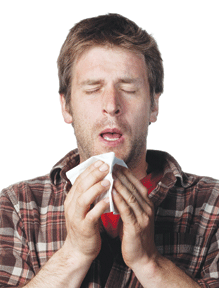


Archive
Advertisers Index
Products & Services
Job Opportunities
Media Kit - PDF
HTAA Sign-up!
Online Classifieds
Receive extra copies!
Driver HEALTH
800-878-0311 x2111
Features
Cover Story
Getting with the programCase Study
The joy of living returnsHealthy Trucking
UptakeJohn Kelley, M.D.
Preventing fluMario Ojeda Jr
On musicJoseph Yao, M.D.
Cubital Tunnel SyndromeMarie Rodriguez
Mind, Body and Spirit
Highway Angels
Driver helps fellow driver survive heart attack
Wheels of Justice
Driver is key to carrier success in CSASalena Lettera
Knowledge is the best medicine
Industry News
It's news to me!
Departments
Publisher's Desk
Hypertension Awareness Month
Murphy's World
Mistakes make great memories
Say What?
What's the best and worst part of your job?
John Kelly, M.D.
Chairman of the HTAA Health and Medical Advisory Board What is flu?
What is flu?
Flu is a contagious respiratory illness caused by influenza viruses. It can cause mild to severe illness, and at times can lead to death. The best way to prevent flu is by getting a vaccine each year.
People who have the flu often feel some or all of the following symptoms:
• Fever or feeling feverish/chills
• Cough
• Sore throat
• Runny, stuffy nose
• Muscle or body aches
• Headaches
• Fatigue
• Some may have vomiting and diarrhea, though this is more common in children than in adults.
How does flu spread?
Flu viruses are generally spread by droplets made when people with flu cough, sneeze or talk. These droplets can land in the mouths or noses of people who are nearby. A person might also get flu by touching a surface or object that has flu virus on it and then touching their own mouth, eyes or nose.
How long is flu contagious?
You may be able to pass on the flu to someone else before you know you are sick, as well as while you are sick. Most healthy adults may be able to infect others beginning one day before symptoms develop and up to five-to-seven days after becoming sick.
How serious is flu?
Flu is unpredictable, and its severity can vary widely from one season to the next, depending on many things, including:
• What specific flu viruses are spreading
• How much of the flu vaccine is available
• When the vaccine is available
• How many people get vaccinated, and
• How well the flu vaccine is matched to the viruses causing illness.
Certain people are at greater risk for serious complications if they get the flu. This includes older people, people with certain health conditions (such as asthma, diabetes, or heart disease), pregnant women and young children.
How can flu be prevented?
The best way to prevent the flu is to get a flu vaccine each season. There are two types of flu vaccines:
• Flu shot
• Nasal-spray flu vaccine
About two weeks after vaccination, antibodies develop that protect against flu.
When should you get the flu vaccine?
Yearly flu vaccination should begin as soon as the vaccine is available, and continue throughout the flu season, which can last as late as May. While flu season can begin as early as October, seasonal flu activity typically peaks in January or later.
Who should get vaccinated?
Everyone six months and older should get a flu vaccine each year. Vaccination is especially important for people who are at high risk of having serious flu-related complications or who live with or care for people at high risk for developing flu-related complications. If you have questions about whether you should get a flu vaccine, consult your health care provider.
How else can flu be prevented?
Good health habits, like covering your cough and washing your hands, can help stop the spread of germs and prevent flu:
• Avoid close contact with people who are sick. When you are sick, keep your distance from others to protect them from getting sick, too.
• Stay at home from work, school and errands when you are sick. You will help prevent others around you from catching your illness.
• Cover your mouth and nose with a tissue when coughing or sneezing. This, too, may prevent those around you from getting sick.
• Clean your hands.
• Washing your hands thoroughly and often will help protect you from germs. If soap and water are not available, use an alcohol-based hand rub.
• Avoid touching your eyes, nose or mouth. Germs are often spread when a person touches something that is contaminated with germs and then touches his or her eyes, nose or mouth.
• Practice other good health habits.
• Get plenty of sleep, be physically active, manage your stress, drink plenty of fluids and eat nutritious food.
This article was adapted from information available from the United States Centers for Disease Control and Prevention. You can learn more at cdc.gov.
John T. Kelly, MD, is Chief Medical Officer of Lifeclinic International, which manufactures blood pressure and weight monitors located in many trucking locations. Dr. Kelly was previously Chief Health and Medical Officer of Union Pacific Railroad.
© Copyright,
Ramp Media Group, 2010